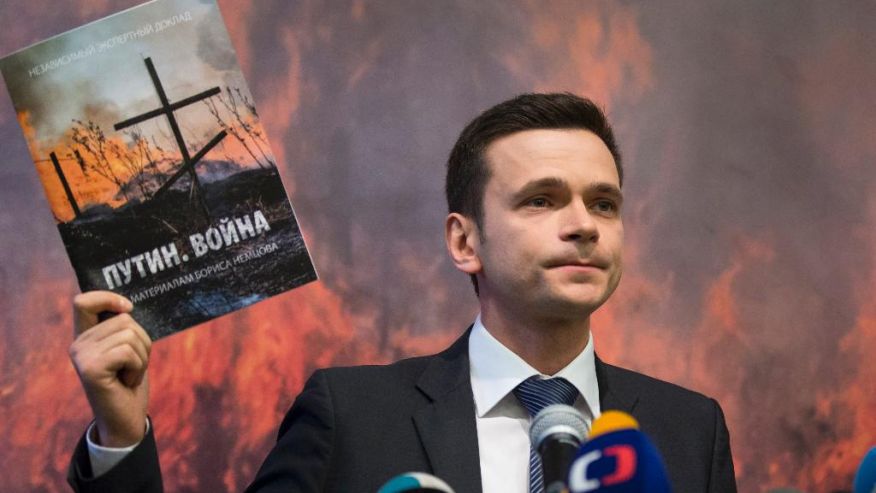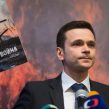
Boris Nemtsov’s Report on Russian War in Ukraine Is Published
Publication: Eurasia Daily Monitor Volume: 12 Issue: 91
By:

The report “Putin. War” (“Putin. Voina”)—a summary of evidence of the involvement of the Russian military in the annexation of Crimea and in fighting in the eastern Ukrainian region of Donbas (encompassing Donetsk and Luhansk provinces)—was published and presented in Moscow this week (May 12). The report commemorates the late Boris Nemtsov (55), former governor of Nizny Novgorod, deputy Duma speaker, deputy prime minister, opposition leader and vocal critic of President Vladimir Putin, who was gunned down last February in downtown Moscow, just a hundred meters from the Kremlin. Nemtsov apparently believed the “Putin. War” report could counter the Kremlin’s official cover-up that denies any Russian military involvement in the fighting in Ukraine or the supply of weapons and munitions to pro-Russia rebels. The official Kremlin propaganda line is: The conflict in Donbas is an internal Ukrainian civil war, and Russia is not involved. This Thursday, Putin’s press secretary and deputy chief of administration Dmitry Peskov announced, “I can only repeat again: any claims of Russian troops deployed on Ukrainian territory are baseless lies” (Interfax, May 14). At the time of his murder, Nemtsov was preparing the “Putin. War” report, but did not finish the text. Activists involved in preparing the publication of “Putin. War” told journalists they used Nemtsov’s notes and materials to complete the report (RBC, May 12). Last March, a Nemtsov supporter who asked to remain anonymous told Jamestown that state investigators had searched the slain politician’s office and flat after his murder, and seized as evidence all papers and computer hard drives. Most of the material prepared by Nemtsov for the “Putin. War” report disappeared and a rewrite seemed inevitable.
According to political activists, up to ten printing houses in Moscow and the Moscow region refused to print the “Putin. War” report, while four others initially agreed to print it and later refused, apparently afraid they would be punished by the authorities. Eventually, an undisclosed printing house agreed to print only 2,000 copies for the presentation on the condition it will not be mentioned and there will be no reference in the paper as to where it was printed (RBC, May 12). “Putin. War” is available at a website Nemtsov had used previously to publish reports on Putin and his policies (Putin-itogi.ru, May 12).
“Putin. War” gathers together numerous reports from different sources about the Russian involvement in Crimea and Donbas. It also collects interviews with Russian servicemen and families of servicemen allegedly lost in action in the Donbas fighting—they have asked their names not be mentioned. According to the report, Russian regular military units invaded Donbas in August 2014 to turn the tide of battle and prevent a defeat of the Moscow-backed rebels. During the fighting with Ukrainian forces, which ended in early September with the signing of the first Minsk ceasefire agreement, Russian regular units lost at least 150 soldiers. The Ukrainian side lost much more. In February 2015, according to the “Putin. War” report, during the rebels’ winter offensive, at least 70 Russian soldiers perished as regular Russian units again became involved in fighting, this time in Debaltseve, northeast of Donetsk. In Debeltseve, Ukrainian units were semi-surrounded by Russian and rebel forces and forced into a humiliating retreat. The worst fighting in Debaltseve happened just after a new ceasefire agreement, known as Minsk Two, was signed in mid-February (Putin-itogi, May 12).
A former deputy finance minister and first deputy chairman of Russia’s central bank Sergei Aleksashenko published in the “Putin. War” report an assessment of Russia’s financial losses connected to the Ukrainian conflict. The weapons and munitions used in the fighting apparently came from army stockpiles, and Aleksashenko considers these expenses to be zero. Still about $1 billion has been spent by Moscow on the war in Ukraine: to pay Russian and local Donbas fighters, on logistics support, and to move Russian troops to the Ukrainian border. Aleksashenko also assesses Russian budget expenses after the annexation of Crimea and the losses resulting from Western sanctions and Russian countersanctions: He concludes these total up to over $50 billion (Putin-itogi, May 12).
The “Putin. War” report was published mainly in digital form available for download on the Internet, and not as a mass printed brochure, as Nemtsov had apparently wanted. The Russian “man in the street” knows little about the “Putin. War” report and does not seem to particularly care. Ukrainian officials have called on Western countries to react to the report and put more pressure on Moscow (Interfax, May 13).
Massive Russian military involvement in secret wars is nothing new. In 2000, the Institute of Military History of the Russian Ministry of Defense published a tell-all book: “Russia (USSR) in Local Wars of the Second Half of the 20th Century.” The publication lists 46 wars and conflicts that involved Russian personnel from 1946 to 2000, and only a handful of these were officially recognized when they happened. Tens of thousands of Russian military personnel took part, hundreds or even thousands perished, and all this was officially denied at the time. These secret wars took place all over the globe in Asia, Africa, the Americas and the Pacific. They have included now forgotten exotic involvements, like the conflict in West Papua (Irian Jaya), when thousands of Russian soldiers, ships, submarines and military aircraft were secretly deployed to Indonesia—then a Soviet ally—to confront Dutch forces there in 1961 and 1962. After several skirmishes, the Dutch withdrew and West Papua was taken over by the Indonesia. At least 3 Russian servicemen were killed in the fighting, and over 200 were decorated with medals. Russian advisors, pilots and soldiers had also fought in the Arab-Israeli wars, in the Algerian war of independence, in Korea, in Vietnam, in Ethiopia, Nicaragua, Mozambique, and in Angola, together with Cuban forces (Militera.lib.ru, 2000).
Arguably, no other country in the world was ever involved so heavily in so many secret wars. Undercover military activity, known as “black ops,” does happen, but the numbers involved are limited. The massive covert deployment of tens of thousands of troops and hundreds of pieces of heavy equipment as well as the loss of life of hundreds of servicemen is possible to keep secret only in a closed, undemocratic society. The Russian military is used to running secret wars that may be disclosed only decades later, after a regime change, when a new tsar in the Kremlin decides to come clean about some undercover dealings of the previous regime. At present, such a disclosure of Russian military activity in Ukraine seems remote, and the “Putin. War” report will be mostly ignored domestically by Russia’s officialdom and the public




